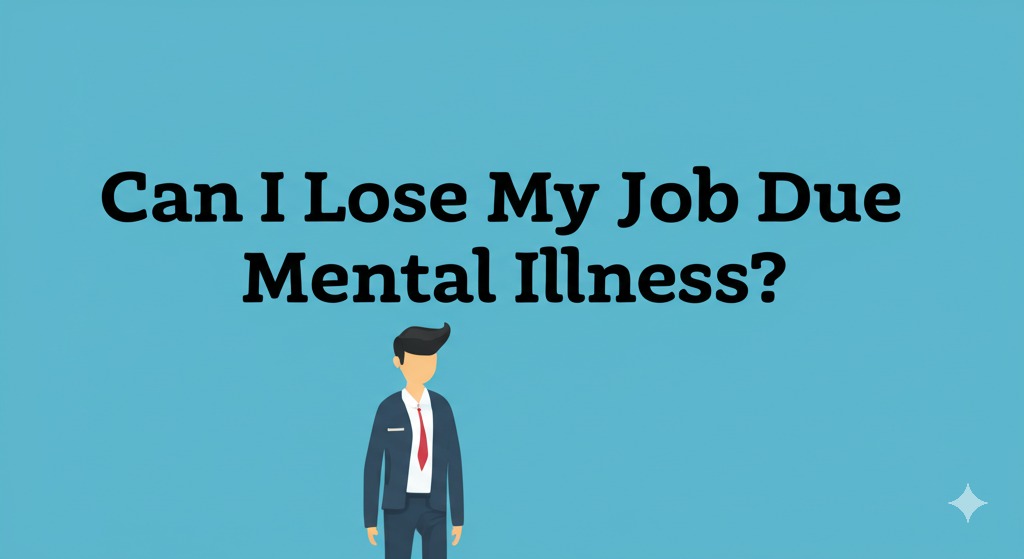
Mental health conversations are becoming more common, but one question still weighs heavily on many professionals: “Can I lose my job due to mental illness?” It’s a deeply personal concern, and understanding your rights and protections is crucial.
Whether you’re managing anxiety, depression, or another mental health condition, knowing how it affects your employment status is not just empowering—it’s essential. In this article, we’ll explore the legal protections, employer responsibilities, and what you can do to safeguard your career while managing your mental health.
Understanding Mental Illness in the Workplace
What Is Considered a Mental Illness?
Mental illnesses refer to a broad range of conditions that affect mood, thinking, and behavior. Common examples include:
- Depression
- Anxiety disorders
- Bipolar disorder
- PTSD
- OCD
- Schizophrenia
These conditions vary in severity and impact. Some individuals may function well with minimal support, while others may need workplace accommodations.
The Rise in Mental Health Awareness
In recent years, there’s been a noticeable shift. More employers are acknowledging the importance of mental well-being. However, stigma still exists, and many workers fear being judged—or worse, fired—for speaking up about their struggles.
Your Legal Rights: Are You Protected?
The Americans with Disabilities Act (ADA)
Under the ADA, employers cannot legally fire you for having a mental illness—if it doesn’t prevent you from performing essential job functions or if reasonable accommodations can be made.
Key protections under the ADA include:
- The right to confidentiality
- Protection from discrimination
- The right to request reasonable accommodations (like flexible hours or modified duties)
To qualify, your mental health condition must substantially limit one or more major life activities.
The Family and Medical Leave Act (FMLA)
The FMLA allows eligible employees to take up to 12 weeks of unpaid leave for serious health conditions—including mental health issues—without the risk of losing their job.
Eligibility includes:
- Working for a covered employer
- At least 12 months of employment
- 1,250 hours worked in the past year
This time can be used for treatment, therapy, or recovery.
When Can Mental Illness Lead to Job Loss?
While protections exist, there are scenarios where mental illness may impact employment:
If Performance Is Severely Affected
If your condition prevents you from completing essential duties, and no reasonable accommodations can help, employers may have grounds to terminate employment—but only after considering accommodations.
If Safety Is at Risk
In rare cases, if a mental health condition poses a direct threat to the safety of others or yourself, employers can take action. However, this must be backed by medical evidence—not assumptions or stereotypes.
If the Condition Is Undisclosed
You’re not legally required to disclose your condition unless you’re seeking accommodations. But if job performance declines and no explanation is given, employers may act on what they observe, not what they don’t know.
Should You Tell Your Employer?
Pros of Disclosure
- Access to accommodations
- Legal protection under the ADA or FMLA
- Openness can foster trust and understanding
Cons of Disclosure
- Fear of stigma or discrimination
- Potential shifts in how you’re treated
Ultimately, disclosure is a personal choice. If you do choose to share, speak to HR or a trusted supervisor, and consider providing documentation from a healthcare provider.
How to Protect Yourself
Know Your Rights
Stay informed about your legal protections. Ignorance leaves you vulnerable—knowledge gives you power.
Keep Records
If you request accommodations or take leave, document everything—emails, doctor’s notes, and HR responses. This can be vital if issues arise.
Seek Support
Don’t navigate this alone. Consider:
- Therapy or counseling
- Employee Assistance Programs (EAPs)
- Legal advice, if necessary
Maintain Open Communication
If you feel comfortable, communicate proactively with your employer about your needs. Transparency can prevent misunderstandings and open the door to support.
Final Thoughts: Your Mental Health Matters
So, can you lose your job due to mental illness? Legally, in most cases, no—especially if you’re protected by laws like the ADA and FMLA. But the reality can be complex, and staying proactive is key.
Protect yourself by understanding your rights, documenting interactions, and seeking support. Your mental health is just as important as your physical health—and you deserve a workplace that respects and supports it.

Andre Cuevas provides career insights, job search strategies, and professional advice to help individuals navigate the job market and achieve their career goals.




